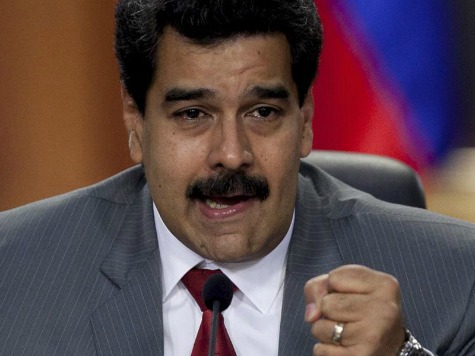The United States government has seen a 1,156% increase of approved Venezuelan political asylum requests in the past 11 years. With protests rattling the nation and Nicolás Maduro’s regime ever more repressive, requests for political asylum have skyrocketed in the past 30 days.
According to Venezuelan newspaper El Nacional, which published the 1,156% statistic Monday, Venezuelans are calling American immigration lawyers in droves, demanding asylum for reasons as varied as “political persecution, threats of kidnapping, and bolstering of Bolivarian [gang] groups.” The dire economic situation the OPEC country finds itself in, where residents are forced to use ration cards for items as quotidian as eggs and milk, has also exacerbated the demand for asylum.
Infobae adds that Venezuelans have become the fourth largest group to demand and successfully obtain political asylum in the United States in the past four years, after China, Egypt, and Ethiopia, respectively. The United States currently has a population of more than 259,000 Venezuelans, 51% of whom have a Bachelor’s degree or higher and 70% of whom speak English fluently. In comparison, 28.5% of Americans born in this country have a college education, according to the United States Census.
The increased demand for asylum has led to new laws limiting the number of Venezuelans who can migrate to the United States. Fusion reports that last month, the United States embassy in Venezuela issued new rules limiting visas due to a lack of staff. The rules currently require Venezuelans to prove political persecution.
Legislators in the United States who have raised the Venezuelan issue argue that the political persecution and socialist exploitation of the Venezuelan people have direct impacts on the United States. In an impassioned Senate floor speech last month, Senator Marco Rubio noted that many of the most powerful oligarchs in the Maduro regime invest their money in American banks and securities. They spend their money on American products, sullying the American market with Venezuelan blood money. This, Sen. Rubio argued, should end with sanctions on Venezuelan leaders until human rights violations in the country end–a proposal similar to that against Russian President Vladimir Putin and his cronies in the aftermath of the recolonization of the Ukrainian state of Crimea. The latest statistics on Venezuelan requests for asylum prove that the dictatorship controlling that country does not only impact the United States economically, but could significantly contribute to the changing face of an evolving America.
Forty-one Venezuelans have died since the arrest of Popular Will opposition party leader Leopoldo López on February 12, 2014. The Maduro regime has since commanded the country’s military, via the National Guard, to attack unarmed protesters and assorted civilians who had organized to call for the release of the nation’s most famous political prisoner. Reports of torture, rape, disfigurement, and murder abound both in breakaway regions like the western, anti-Chavista state of Táchira and in the capital, Caracas.
Anti-socialist protesters united this weekend to celebrate Easter with mass prayers for the end of the Maduro regime and the freedom of the Venezuelan people. In response, Maduro sent troops to the streets of several capitals to attack peregrines with tear gas, water guns, and hand weapons, hoping to disperse crowds.

COMMENTS
Please let us know if you're having issues with commenting.